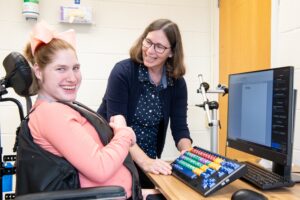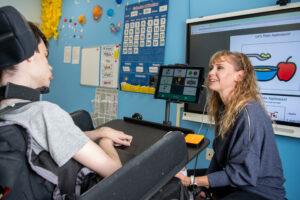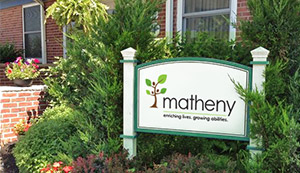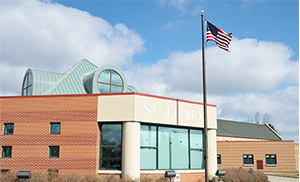The Matheny School enriches the lives of NJ’s most vulnerable students
 March 21, 2024, Peapack, NJ – At the Matheny School the sounds of silence are never welcome. Silence is not a virtue here. Nor is sitting quietly in a classroom absorbing a teacher’s lecture on geography, waiting for the bell to ring. This school is clearly different from the traditional schools that most of us know. According to Principal Sean Murphy, “We work closely with any school district that needs our help. We are here to ensure that out-of-district placement is available to those who qualify so that every student gets the best educational and life enriching opportunities they can find.”
March 21, 2024, Peapack, NJ – At the Matheny School the sounds of silence are never welcome. Silence is not a virtue here. Nor is sitting quietly in a classroom absorbing a teacher’s lecture on geography, waiting for the bell to ring. This school is clearly different from the traditional schools that most of us know. According to Principal Sean Murphy, “We work closely with any school district that needs our help. We are here to ensure that out-of-district placement is available to those who qualify so that every student gets the best educational and life enriching opportunities they can find.”
Matheny School’s students range in ages from pre-school through high school – students graduate at the age of 21. Matheny was established in 1946 by a husband and wife, both educators, to provide a stimulating and effective learning and living environment for children with a wide range of medically complex developmental disabilities. At the time, Marguerite and Walter Matheny could not find such a place for their son Chuck—born with cerebral palsy on March 30, 1941. He became the inspiration for the founding of Matheny, and its decades-long development into a renowned specialized school, an accredited special hospital, adult day programs, and community-based group residences. Students here complete all state requirements to earn their high school diplomas, like their peers in traditional schools.
When a new student starts at The Matheny School, there is an initial evaluation of their language and feeding skills. Christine Mayercik, the school’s speech language pathologist points out that the goal is for the student to take the skills learned in therapy and then to use these skills outside of therapy—in the classroom, at home, with caregivers and out in the community. The therapist also works with teachers and caregivers to help facilitate the student’s communication and help ensure their success. “Students often get 90 minutes of therapy each week, but never less than 60 minutes per week,” according to Mayercik. Like traditional schools, Matheny issues quarterly reports, evaluating each student’s progress toward their individual goals. “Here, it’s all about learning to communicate your thoughts and needs, and learning the subject matter ‘your way’,” stated Mayercik.
the goal is for the student to take the skills learned in therapy and then to use these skills outside of therapy—in the classroom, at home, with caregivers and out in the community. The therapist also works with teachers and caregivers to help facilitate the student’s communication and help ensure their success. “Students often get 90 minutes of therapy each week, but never less than 60 minutes per week,” according to Mayercik. Like traditional schools, Matheny issues quarterly reports, evaluating each student’s progress toward their individual goals. “Here, it’s all about learning to communicate your thoughts and needs, and learning the subject matter ‘your way’,” stated Mayercik.
Some students use iPads with dedicated communication apps as their primary communication tool. “Our kids are mobile, moving from classroom to classroom or to therapy sessions during the day. They need a communication device that moves with them—light enough to be mounted on their wheelchair or mounted to a classroom chair. For those that are ambulatory, the device needs to be light enough to hold in their hands or in a backpack.”
Therapists work together to include vocalizations, eye gaze, facial expressions, body language, gestures, and sign language, in addition to augmentative communication devices. The watchwords with students are always to help them be as independent as possible. All seniors participate in the PCAST (Person-Centered Approaches in Schools and Transition) program. “We help each student prepare for their post high school life by identifying their likes and dislikes, their needs, the activities and things that make them happy, and their hopes and plans for the future,” said Mayercik
The students each put together a booklet talking about themselves, which Mayercik calls, “the Cliff Notes on who the student is. What technology the student uses is part of that, since technology is part of their daily lives.” One of the school’s main focus is communication, particularly as graduates take their next steps into their future.
Ten students will proudly graduate from The Matheny School this spring. They will wear caps and gowns and listen to messages from the class valedictorian and salutatorian; and as they receive their hard-earned diplomas, their families and friends will cheer. All students will have learned the primary lessons that their teachers and parents strive to impart—culminating in the graduates’ readiness to move into their young adult lives.
A Matheny School mom expressed her gratitude for the education her daughter Serenity has received at Matheny. “I am tremendously grateful for their teamwork and efforts! These are huge accomplishments in our world and make such an impact on our success with keeping our children safe, healthy and happy! Thank you for taking such wonderful care of our daughter and being flexible, innovative and patient while still providing the best possible opportunities.” said Renee Apuzzo.
School enrollment takes place year-round and an extended school year is available to all. Families and caregivers of students with medically complex disabilities are invited to tour Matheny to witness everything Matheny has to offer. Call us at (908) 234-0011, ext. 1264 or email us at schooladmissions@matheny.org to schedule a tour.
###
Photo Caption: Matheny student Emma Webster works with Donna Kelly, Matheny’s Director of Occupational Therapy
About Matheny. Matheny’s mission is to provide exceptional care and an optimal quality of life for children and adults with special needs and medically complex developmental disabilities. Matheny is a 501c3 nonprofit organization and is headquartered in Somerset County. It was founded in 1946 after Walter and Marguerite Matheny’s son, Chuck, was born with cerebral palsy (CP) into a world ill-equipped to care for children with special needs. Matheny patients have a diverse range of medical conditions such as Cerebral Palsy, Spina Bifida, Lesch-Nyhan Disease (LND) and a wide range of rare diseases. Matheny is comprised of a special hospital, five community group homes, an adult day center, a non-profit private special school, and outpatient clinics serving the community. To learn more about Matheny, visit us at http://www.matheny.org or follow us on Facebook, Twitter, LinkedIn, and Instagram: @mathenymedical.



